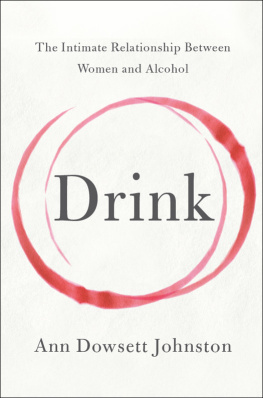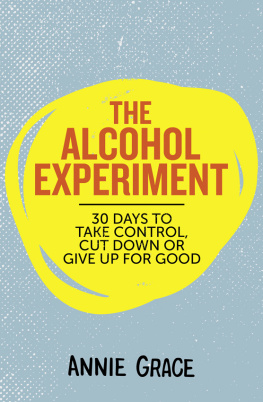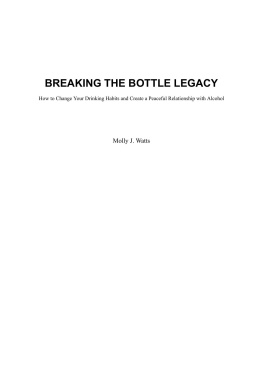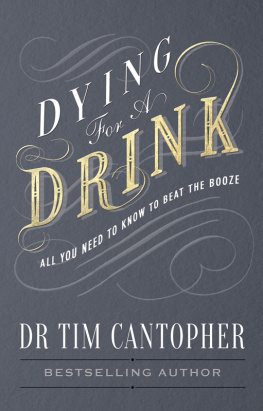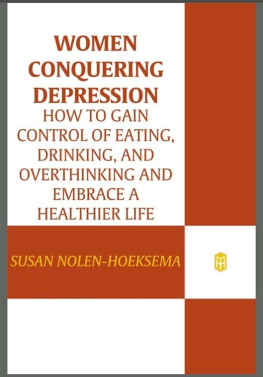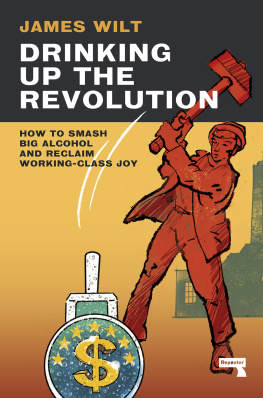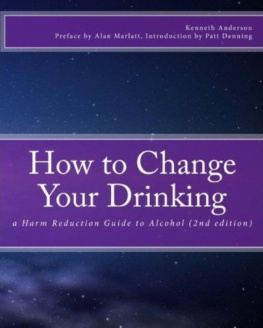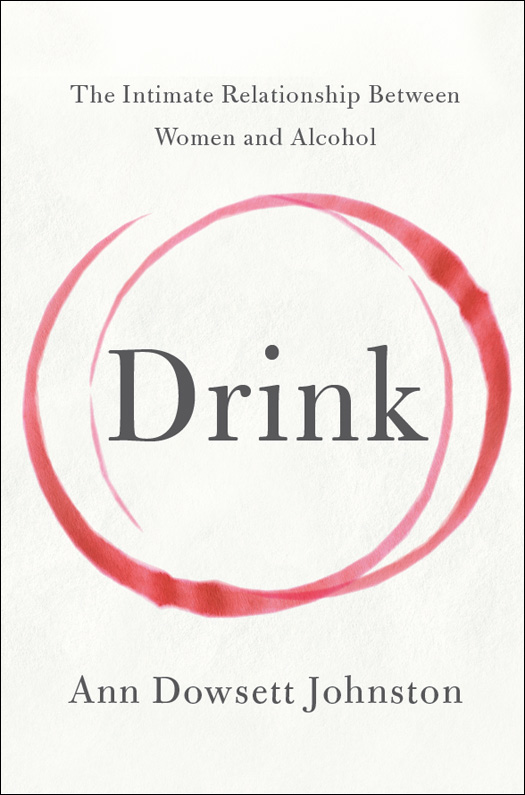TO MY MOTHER,
for her courage and love
AND TO NICHOLAS,
for his infinite wisdom
Our excesses are the best clue we have to our own poverty, and our best way of concealing it from ourselves.
ADAM PHILLIPS, BRITISH PSYCHOANALYST
CONTENTS
The names and other identifying details of some major and minor characters have been changed to protect individual privacy and anonymity.
Hang out in the brightly lit rooms of AA, or in coffee shops, talking to dozens of women who have given up drinking, and this is the conclusion you come to: for most, booze is a loan shark, someone they trusted for a while, came to count on, before it turned ugly.
Every person with a drinking problem learns this the hard way. And no matter what the circumstances, certain parts of the story are always the same. Here is how the story goes:
At first, alcohol is that elegant figure standing in the corner by the bar, the handsome one in the beautiful black tuxedo. Or maybe hes in black leather and jeans. It doesnt matter. You cant miss him. Hes always at the partyand he always gets there first.
Maybe you first saw him in high school. Many do. Others meet him long before. He finds his moment, some time when youre wobbly or nervous, excited or scared. Youre heading into a big party or a dance. All of a sudden your stomach begins to lurch. Youre overdressed, or underdressed; too tall, too short; heartsick, or heart-in-your-mouth anxious. Doesnt matter. Booze wastes no time. He sidles up with a quick hit of courage. You grab it. It feels good. It works.
Or maybe youve fallen in love. Youre at a wedding, a dinner, a celebration. You want this moment to last. You fear it wont. Just as your doubts begin to get the best of you, booze holds out a glass, a slim stem of liquid swagger, pale blond and bubbly. You take a sip and instantly the room begins to soften. So do you: your toes curl a little, your heart is light. All things are possible. Now this is a sweetheart deal.
This is how it begins. And for many, this is where it ends. Turning twenty-one or twenty-five or thirty, some will walk into a crowded room, into weddings or graduations or wakes, and for them, hes no longer there. Totally disappeared. Or perhaps they never saw him in the first place. And he doesnt seek them out. Theyre not his people.
But you? Youve come to count on him, this guy in black. And as the years pass, he starts showing up on a daily basis. Booze has your back.
In fact, he knows where you live. Need some energy? Need some sleep? Need some nerve? Booze will lend a hand. You start counting on him to get you out of every fix. Overworked, overstressed, overwhelmed? Lonely? Heartsick? Booze is there when you need him most.
And when you dont. Suddenly, you realize booze has moved in. Hes in your kitchen. Hes in your bedroom. Hes at your dinner table, taking up two spaces, crowding out your loved ones. Before you know it, he starts waking you up in the middle of the night, booting you in the gut at a quarter to four. You have friends over and he causes a scene. He starts showing you whos boss. Booze is now calling the shots.
You decide youve had enough. You ask him to leave. He refuses. A deal is a deal, he says. He wants payback and he wants it now. In fact, he wants it all: room and board, all your money, your assets, your familyplus a lot of love on the side. Unconditional love.
You do the only thing you can think to do: you kick him out, change the locks, get an unlisted number. But on Friday night, he sneaks back in, through the side door. You toss him out again. Hes back the very next day.
Now youre scared. This is the toughest thing youve ever dealt with. You decide to try the geographical cure: you quit your job, pull up stakes, relocate to a new city where no one knows you. Youll start afresh.
But within days, booze comes calling in the middle of the night. Like all loan sharks, hes one step ahead of you and he means business.
This is how it happens.
This is addiction.

To be rooted is perhaps the most important and the least recognized need of the human soul.
SIMONE WEIL
For me, it happened this way: I took a geographic cure to fix what I thought was wrong with my life, and the cure failed.
Much later, I would learn the truth: geographic cures always fail, especially when theyre designed to correct problematic drinking.
Of course, that wasnt how I saw it at the time. In the winter of 2006, when I pulled up stakes and moved to Montreal, I was full of hope. Hope that my fabulous new career would blossom. Hope that my long-distance sweetheart and I would flourish in this new city. Sitting by candlelight at my farewell dinner, these were the dreams I shared with my closest friends.
The third hope I kept to myself: that with this move, my increasingly troubling drinking habits would miraculously disappear. That my nightly craving for a glass of wineor threewould go poof.
I was full of new resolve. I had made a New Years resolution never to drink alone. I had made that promise to my sweetheart, and I intended to keep my word.
It was an icy blue February afternoon when I first dragged my suitcase up the marble stairs of Sam Bronfmans faux castle on Montreals Peel Street, a Disneyesque confection that had been headquarters to the worlds largest distillery for many decades. Donated to McGill University in 2002, Seagram House had taken on new life as Martlet House, named for the small red bird on the universitys crest, believed to be blessedor was it cursed?with constant flight.
A martlet never rests. I chose to see this as a happy omen. I was looking for signs that I had made the right decision in accepting the big job of vice principal of McGill, in charge of development, alumni, and university relations. I had left my beloved home in Toronto and a successful career in journalism. I took this Martlet business seriously.
As vice principal, I was ushered into Bronfmans large second-floor office, the very same place where the booze baron had hosted Joe Kennedy and Al Capone during Prohibitionor so the story goes. It was here that I would sit, at his massive hand-carved desk, ensconced at one end of an airless chamber, walled with recessed curved bookcases and ornate oak paneling. The history was impressive. Once upon a time, the office had been, too. But when I arrived, stained green carpet, broken overhead fixtures, and the lack of natural light made the room oppressive. Still, it had loads of potential. I was optimistic.
In honor of my arrival, a fellow vice principal had placed hot pink gerbera daisies in a jaunty citrine vase. There were welcoming bouquets from the principal and others, and a vast array of notes and cardsa happy distraction on my first day. My gut was speaking to me, but I chose not to listen.
Over time, I grew to dread that behemoth of a desk, and all it represented. But on the first day, its novelty was a distraction. My effervescent blond assistant, only two years out of university herself, perched opposite me, pulling out the secretarys table to write on. She introduced me to a fat binder and handed over a pile of documents for my signature. Most of all, she was interested in securing a date for my welcoming reception. Her top choice was St. Patricks Dayor St. Patio Day, as she liked to call it, the booziest day on the Montreal calendar, and her personal favorite. (She was single and anxious to change that status.)

